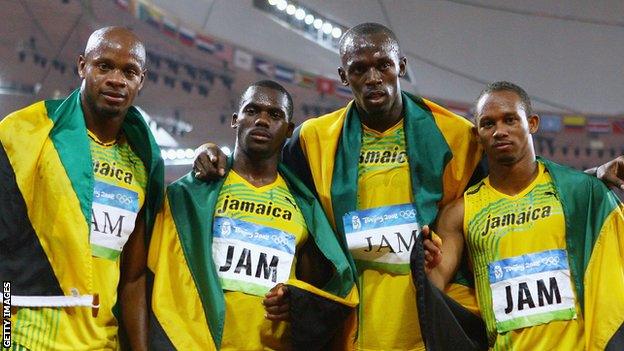Usain Bolt could lose Olympic gold medal over Nesta Carter doping reports
- Published

Nesta Carter (second from left) and Usain Bolt (second from right) won gold for Jamaica in Beijing
Jamaica's Usain Bolt could lose one of the three gold medals he won at the 2008 Beijing Olympics.
Reuters report that the 'A' sample of one of his team-mates in the 4x100m, Nesta Carter, was found to contain the banned substance Methylhexanamine.
The news comes after the retesting of 454 samples from the 2008 Games.
Carter, who along with his agent has not replied to requests for comment, will face sanctions if his 'B' sample also tests positive for the substance.
The 30-year-old ran the first leg for Jamaica's 4x100m relay team in Beijing, which also included Michael Frater, Asafa Powell and Bolt.
The team took gold in what was then a new world record of 37.10 seconds, ahead of Trinidad and Tobago and Japan.
Carter was also a member of Jamaica's gold medal-winning relay teams at the 2011, 2013 and 2015 World Championships as well as the 2012 Olympic Games.
He has not run this season, because of a foot injury, but is expected to return to the track ahead of Jamaica's Olympic trials from 30 June to 3 July.
Methylhexanamine has been on the World Anti-Doping Agency (Wada) Code prohibited list since 2004, although it was reclassified on the 2011 list as a "specified substance", meaning one that is more susceptible to a "credible, non-doping explanation".
Sold as a nasal decongestant in the United States until 1983, Methylhexanamine has been used more recently as an ingredient in dietary supplements.
The IOC programme of revisiting samples is aimed at using developments in testing techniques to expose traces of drugs that were undetectable in 2008 or 2012.
In previous doping cases where individual members of a medal-winning relay squads have tested positive for a banned substance, the whole team is stripped of their medal.
The United States men's 4x100m team were stripped of their silver medals from the 2012 Olympics after Tyson Gay's doping case.
- Published11 August 2012

- Published3 March 2018

- Published8 February 2019
